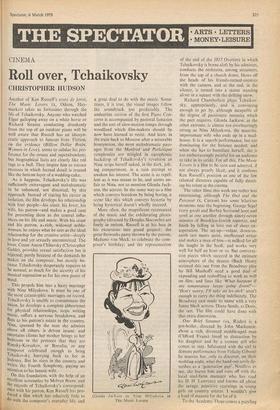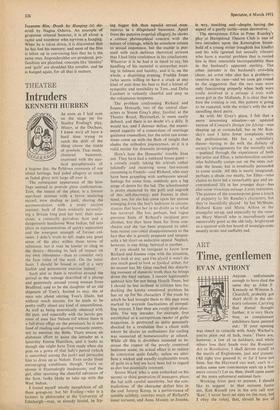• ARTS • LETTERS • MONEY. LEISURE CINEMA
Roll over, Tchaikovsky
CHRISTOPHER HUDSON
Another of Ken Russell's tours de force, The Music Lovers (x, Odeon, Hay- market) takes us fortissimo through the life of Tchaikovsky. Anyone who watched Elgar galloping away on a white horse or Richard Strauss conducting drunkenly from the top of an outdoor piano will be well aware that Russell has an idiosyn- cratic approach to famous lives. Fiction, on the evidence (Billion Dollar Brain, Women in Love), seems to subdue his pre- ference for the ornate and superabundant; but biographical facts are clearly like red rags to a bull. They inspire him to rococo excesses in which factual detail is treated like the bottom layer of a wedding-cake.
As it happens. Tchaikovsky's life was sufficiently extravagant and melodramatic to be enhanced, not distorted, by this approach. Instead of tracing his career in isolation, the film develops his relationship With four people—his sister, his lover, his Wife, his patron—and makes a good case for presenting them as the central influ- ences on his life and music. With his sister and his patron, a. rich, widowed noble- woman, he enjoys what he sees as the ideal relationship for the creative artist—deeply in love and yet sexually uncommitted. The lover, Count Anton Chiluvsky (Christopher Gable), provides sexual satisfaction but is rejected; partly because of the demands he makes on the composer, but mostly be- cause Tchaikovsky desperately requires to be normal, as much for the security of his Musical reputation as for his own peace of mind.
This propels him into a hasty marriage With Nina Milyukova. It must be one of the most catastrophic marriages on record. Tchaikovsky is unable to consummate the union, he develops a complete abhorrence for physical relationships, stops writing Music, suffers a nervous breakdown, and flees to his patron's estate in the country. Nina, spurned by the man she admires above all others, is driven insane, and entertains clients her mother brings to her bedroom in the pretence that they arc Rimsky-Korsakov, or Borodin, or any composer celebrated enough to bring Tchaikovsky hurrying back to her in Jealousy. But he stays in the country and writes the Fourth Symphony, paying no attention to-his lunatic wife.
On this foundation, with the help of an excellent screenplay by Melvyn Bragg. and the records of Tchaikovsky's correspond- ence with his patron, Ken Russell has pro- duced a film which has relatively little to do With the composer's everyday life, and a great deal to do with the music. Some- times, it is true, the visual images follow the soundtrack too predictably. The andantino section of the first Piano Con- certo is accompanied by pastoral fantasies and the sort of slow-motion romps through woodland which film-makers should by now have learned to resist. And later, in the train back to Moscow after a miserable honeymoon, the most melodramatic pass- ages from the Manfred and PatUtique symphonies are mingled in cacophonic backdrop of Tchaikovsky's revulsion as Nina strips herself naked. in the dark, jolt- ing compartment, in a . vain attempt to awaken his interest. The scene is as repel- lent as it was meant to be, and seems un- fair to Nitta, not to mention Glenda Jack- son. the actress. In the same way as a film which conveys boredom by being boring, a scene like this which conveys hysteria by being hysterical doesn't wholly succeed.
More often, the magnificent razzmatazz of the music and the exhilarating photo- graphy (directed by Douglas Slocombe) are finely in unison. Russell is at his best in his excursions into grand guignol; the great fireworks party thrown by the patron, Madame von Meek. to celebrate the com- poser's birthday; and the representa 'ion ,Glenda Jackson as Nina Milyakova in The Music Lovers of the end of the 1812 Overture in which Tchaikovsky is borne aloft by his admirers, conducts the orchestra, among streamers, from the top of a church dome, blows off the heads. of his friends-turned-enemies with the cannon, and at the end, in the silence, is turned into a statue standing alone in a square with the drifting snow.
Richard Chamberlain plays Tchaikov- sky. appropriately, and is convincing enough to get by. although incapable of the degree of passionate intensity which the part requires. Glenda Jackson, at the other extreme, is almost too overbearingly strong as Nina Milyukova, the neurotic, importunate wife who ends Up in a mad- house. It is a superb performance, but too dominating for the balance needed; and when she has to humiliate herself, she is too embarrassingly painful for an audience to take in its stride. For all this. The Music Lovers is a film to be seen and admired, if not always greatly liked; and it confirms Ken Russell's position as one of the few talented directors capable of fully direct- ing his talent at the cinema.
The other films this week are rather less entertaining, - although The Owl and the Pussycat (x, Curzon) has some hilarious moments near the beginning. George Segal (very good) and Barbra Streisand hoot and yowl at one another through ninety-seven minutes of Brooklyn-Jewish repartee, and finish by falling in love out of sheer ex- asperation. The set-up—vulgar, down-to- earth tart meets quiet, intellectual writer and makes a man of him—is milked for all the laughs in the book, and works very well for half an hour or so. But conversa- tion pieces which succeed in the intimate atmosphere of the theatre (Buck Henry scripted this one from the Broadway play by Bill Manhoff) need a good deal of expanding and reshuffling to work as well on film; and lines like 'What happens if my temperature keeps going. down?'— Don't worry, I'll take an ire-pick' aren't enough to carry the thing indefinitely. The Broadway cast made its name with a very funny black actress, Diana Sands, as Doris, the tart. The film could have done with that extra dimension, One Brief Slimmer (AA, Rialto) is a pot-boiler, directed by John Mackenzie. about a rich, divorced middle-aged man (Clifford Evans) loved to distraction by his daughter and by a teenage girl who comes to stay. Infatuated with the girl (a denture performance from Felicity Gibson) he marries her, only to discover, on their wedding night, what the hand-out coyly de- scribes as a 'generation gap'. Needless to say, she leaves him and runs off with the local stud-farm manager who has read his D. H. Lawrence and knows all about the savage, primitive yearnings in young girls on country estates. I wouldn't give a load of manure for the lot of it.
To the Academy Three comes a puzzling Japanese film, Death by Hanging (x) dir- ected by Nagisa Oshima. An example of gruesome oriental humour, it is all about a rapist and murderer who survives a hanging. When he is taken down, it is discovered that he has lost his memory, and most of the film is taken up in convincing him that he is the same man. Imponderables are pondered, pro- fundities are plumbed, concepts like 'identity' and 'guilt' are shredded like noodles, and he is hanged again, for all that it matters.



































 Previous page
Previous page